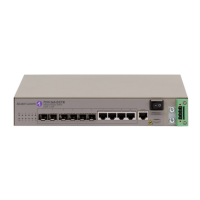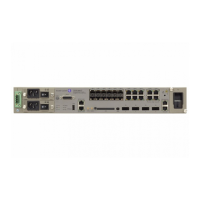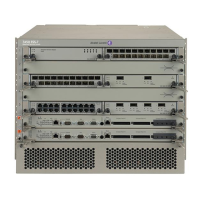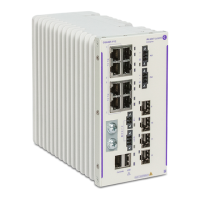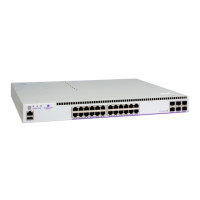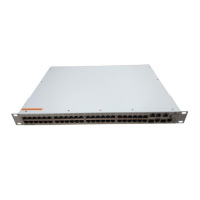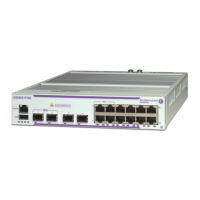MPLS Transport Profile (MPLS-TP)
Page 44 7210 SAS M, T, X, R6, Mxp MPLS Configura-
tion Guide
status “change” events in 10 seconds, the system will “hold-down” the spoke-sdp on the local node
with the last received non-zero pw-status bits for 20 seconds. It will update the local spoke with
the most recently received pw-status. This hold down timer is not persistent across shutdown/no-
shutdown events.
Pseudowire Redundancy and Active / Standby Dual Homing
PW redundancy is supported for static MPLS-TP pseudowires. However, instead of using T-LDP
status signaling to signal the forwarding state of a PW, control channel status signaling is used.
The following PW redundancy scenarios are available:
• MC-LAG with single and multi-segment PWs interconnecting the PEs.
• The 7210 SAS-T can only act as T-PE when a multi-segment PW is used.
• The 7210 SAS-R6 can act as T-PE or S-PE when a multi-segment PW is used.
• Dual-homing of a VLL service into redundant IES or VPRN PEs (the IES and VPRN
service is configured on the 7750 PEs), with active/standby PWs.
→ In this scenario, 7210 SAS originates the Epipe MPLS-TP PWs as a T-PE. 7210 SAS
nodes cannot terminate a MPLS-TP PW in a IES or VPRN service.
• Dual-homing of a VLL service into a VPLS with active/standby PWs.
→ In this scenario, 7210 SAS originates the Epipe MPLS-TP PWs as a T-PE. 7210 SAS-
R6 nodes can terminate a MPLS-TP PW in a VPLS service.
Note that the active/standby dual-homing into routed VPLS is not supported in for MPLS-TP
PWs.
It is possible to configure inter-chassis backup (ICB) PWs as static MPLS-TP PWs with MPLS-TP
identifiers. Only MPLS-TP PWs are supported in the same endpoint. That is, PWs in an endpoint
must either be all MPLS-TP, or none of them must be MPLS-TP. This implies that an ICB used in
an endpoint for which other PWs are MPLS TP must also be configured as an MPLS-TP PW.
A fail over to a standby pseudowire is initiated based on the existing supported methods (For
example, failure of the SDP).
MPLS-TP LSP Protection
Linear 1-for-1 protection of MPLS-TP LSPs is supported, as defined in RFC 6378. This applies
only to LSPs (not PWs).

